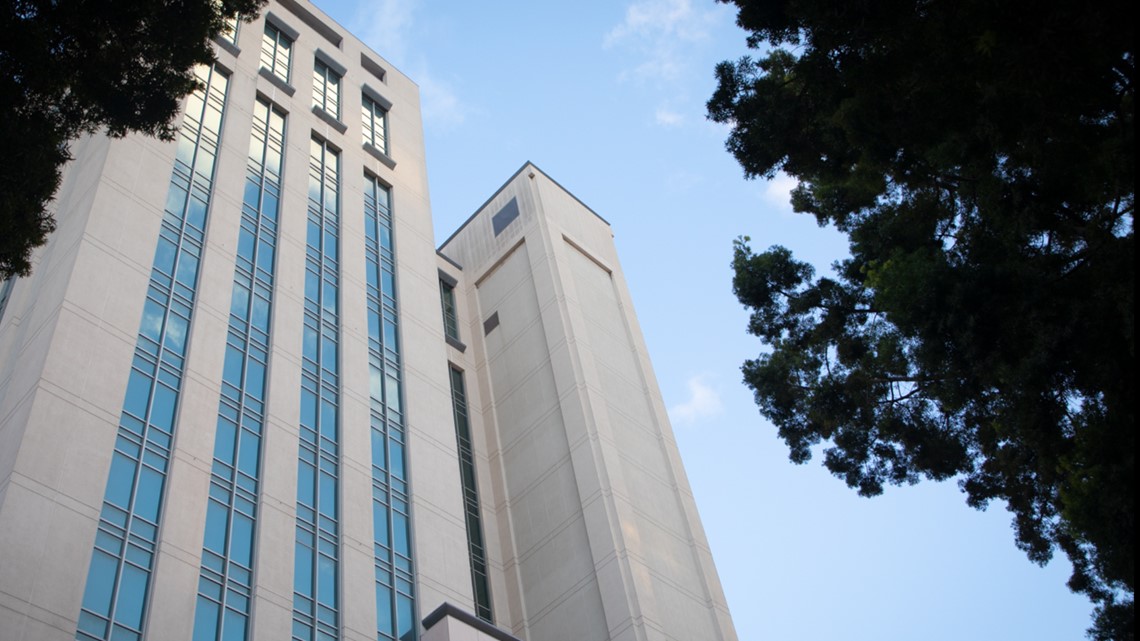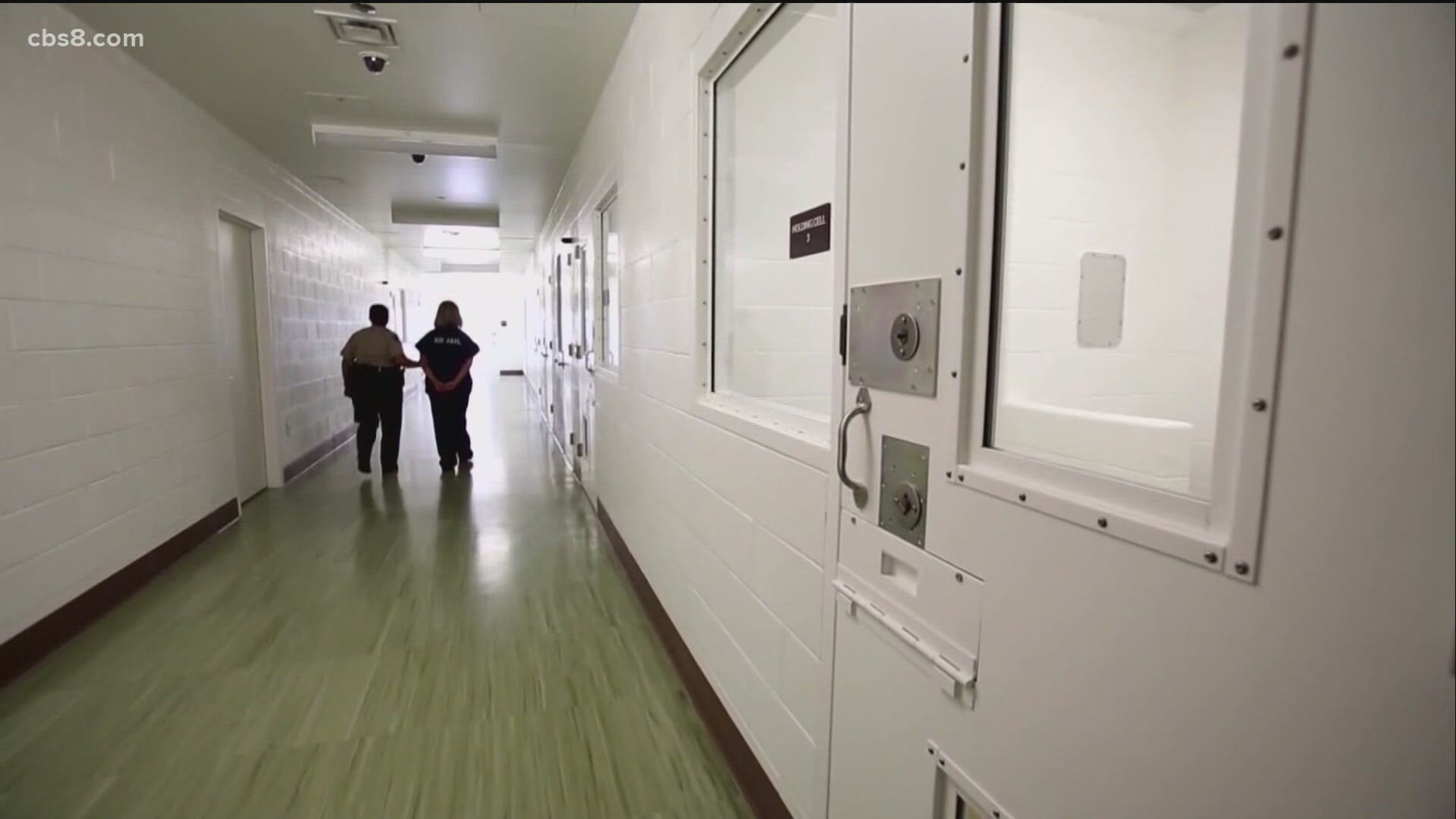SAN DIEGO COUNTY, Calif. — San Diego County has prioritized corrections officers for COVID-19 vaccines while thousands of inmates haven’t been offered doses.
About 4,000 people are locked in one of the county’s seven jails each day, and because of high turnover and short sentences, many more come into contact with these detention centers each month. Yet only 26 inmates have been inoculated since January, according to data the Sheriff’s Department provided Wednesday.
The low vaccination rates could signal trouble. Because people cycle in and out of jails quickly, inmates are potential vectors who can carry the virus from detention centers into neighborhoods. Research has linked jails and prisons to high infection rates in nearby communities.
The vaccinated inmates include five people who were discharged after getting their first dose and 10 still incarcerated who have yet to receive their second dose.
Meanwhile, 476 jail workers have received at least one shot from the sheriff’s medical services division, according to the data. That adds up to roughly a quarter of corrections employees.
Staff who were vaccinated through other means aren’t included in the numbers — nor are those who participated in a “zero-waste” vaccine program offered by Cal Fire San Diego, which was giving spare doses to law enforcement officers before they were eligible.
“It’s really devastating, actually, to hear that so few people in jail have been vaccinated,” said Naomi Sugie, an associate criminology professor at UC Irvine.


“It is really good that the employees are getting vaccinated at such high rates, but we have to give the same sort of priority, out of public health concerns, to people who are incarcerated in those facilities,” Sugie said.
The county public health department opened vaccinations to law enforcement officers on Feb. 27, but only inmates who are 65 and older were eligible. Lt. Ricardo Lopez, a Sheriff’s Department spokesperson, said everyone in that age group has been offered vaccines and 25 declined.
Lopez said the department follows county and state guidelines and offers inmates vaccines as soon as they’re available.
"It's all depending on when we get the vaccines from the county,” he said.
While hundreds of corrections staff received vaccines in February and March, an outbreak was spreading at George Bailey Detention Facility in Otay Mesa. A man booked in mid-February for driving under the influence was transferred to the jail and began showing COVID-19 symptoms, according to the Sheriff’s Department. At least 47 inmates have tested positive for the virus since then.
The county is following state guidelines, which were updated this week to include all inmates in the next phase of vaccinations that starts on Monday, spokesperson Sarah Sweeney said.
This is happening as the county continues to struggle to secure enough doses for those who are already on the priority list. A shortage of vaccines has forced local officials to repeatedly close public vaccination sites and prioritize those who haven’t been able to get their second shots.


To prevent outbreaks, some counties have jumped ahead of the state’s plan and already offered vaccinations to all of their inmates. Sacramento, Santa Clara and Contra Costa counties have done so, but San Diego County has not. Its vaccine rollout plan doesn’t mention jails.
“There’s really no reason to be prioritizing corrections staff over people who have these vulnerabilities, who are inside jails and prisons,” said Wanda Bertram, a spokesperson at the national nonprofit Prison Policy Initiative.
Federal agencies acknowledge people in detention centers have higher rates of many medical conditions, which make them more susceptible to COVID-19. And because they live in confined quarters, the virus can spread easily once inside the facilities.
More than 1,200 people in San Diego County jails have tested positive for COVID-19 since the pandemic began, and the Sheriff’s Department has acknowledged one inmate death from the virus. At least 553 department employees, including those who don’t work in the jails, have contracted it, and one has died.
In a class-action lawsuit filed this week, the San Diego chapter of the American Civil Liberties Union claimed Sheriff Bill Gore and his department have inflicted cruel and unusual punishment on inmates by housing them in crowded, unsanitary spaces without adequate medical care. It demands inmates receive vaccines as soon as possible and jail populations be reduced to prevent the spread of the virus.


“There is no reasonable dispute about the importance of vaccines and the urgent need for prompt vaccination,” the lawsuit says.
The ACLU co-filed the suit with a San Diego law firm and a social justice advocacy group co-founded by Geneviéve Jones-Wright, a former deputy public defender who ran for county district attorney in 2018.
Their complaint tells the story of Terry Leroy Jones, who lives in the medical housing unit of the George Bailey Detention Facility because of his asthma, diabetes and prosthetic leg. The 55-year-old is jailed on a home invasion robbery charge.
A man with COVID-19 symptoms was placed in Jones’ unit for three days before testing positive, the lawsuit says, causing him and most of the other inmates in nearby bunks to catch the virus.
Jones “would like vaccines to be made available to people incarcerated in the jails to help prevent COVID-19 from continuing to spread, especially because of how frequently people are moved around the facilities,” according to the lawsuit. “But jail staff have never said anything about the vaccines to him and he knows about them only because of the news.”
The suit also says corrections staff have told inmates “they will be the last in line to receive a vaccine.”
At California prisons, more than 42,000 inmates and 25,000 staff have been vaccinated. A spokesperson for the Richard J. Donovan Correctional Facility deferred questions to the state agency that handles healthcare in prisons, which refused to say how many inmates at the prison in Otay Mesa have received vaccines.
The facility has seen nearly 1,000 infections and the state’s COVID-19 tracker shows 18 deaths.
“We know how horrible these conditions are and yet we subject people to them without batting an eye,” said Khalid Alexander, president and founder of Pillars of the Community, a San Diego nonprofit advocating for change in the criminal justice system.
“If you take away someone’s ability to stay healthy,” he said, “if you take away someone’s ability to do any kind of the basic care for their basic needs, whose responsibility is it?”
Correction: 11 a.m., March 15, 2021
An earlier version of the story incorrectly stated which Sheriff’s Department employees had contracted COVID-19.

